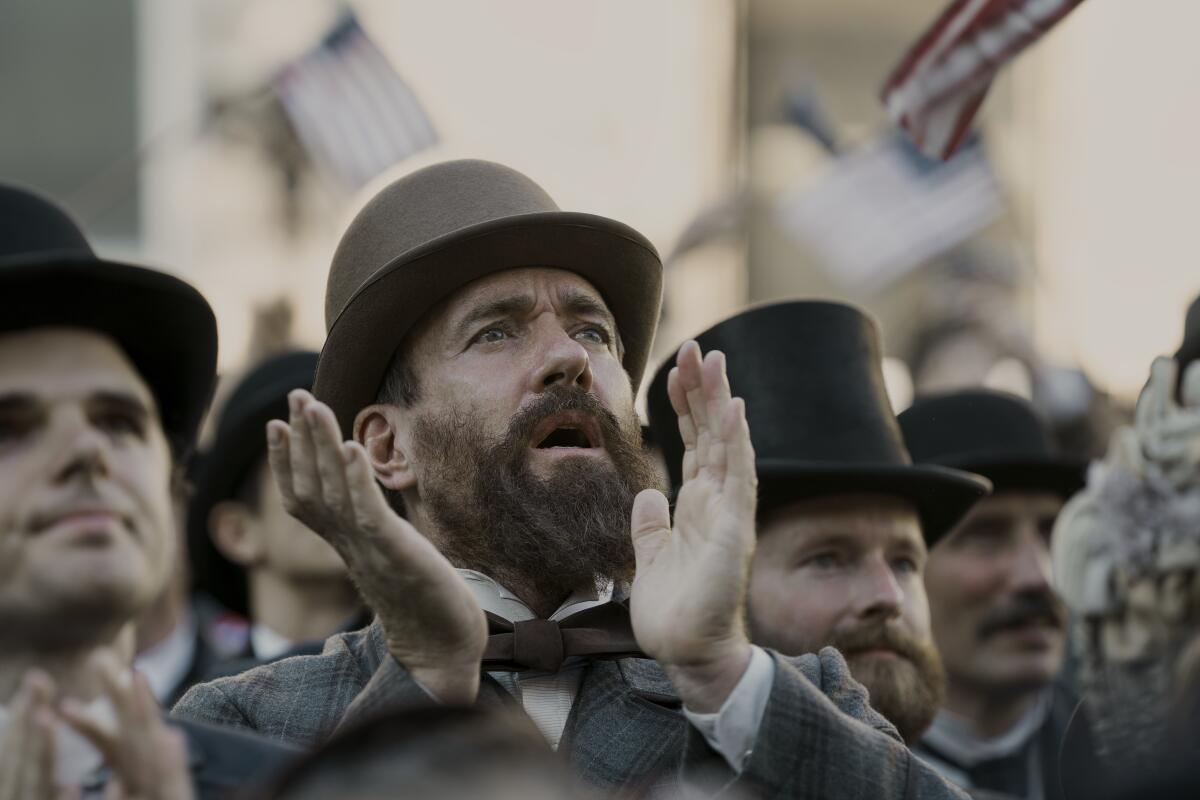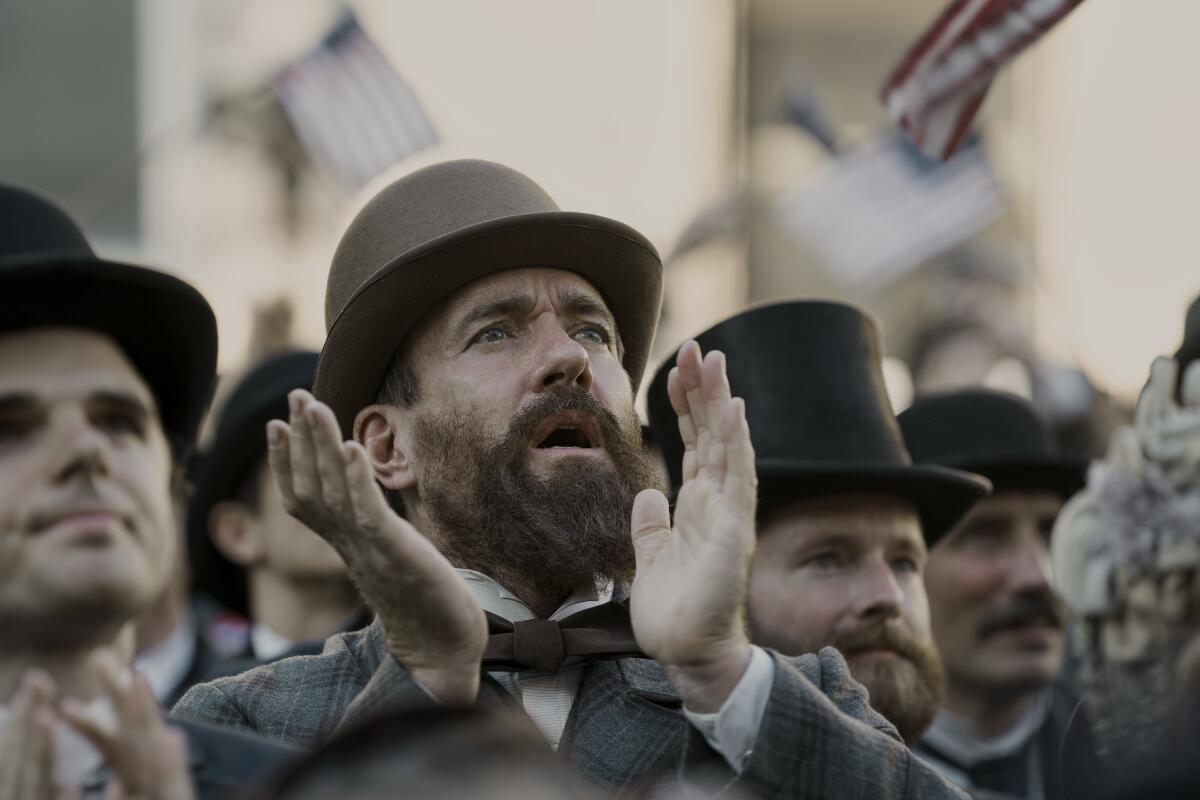‘Death by Lightning’ review: A surprising story about President Garfield
“Death By Lightning,” premiering Thursday on Netflix, introduces itself as “a story about two men the world forgot,” and while it is undoubtedly true that few in 2025 will recognize the name Charles Guiteau, many will know James A. Garfield, given that he was one of only four assassinated American presidents. There are less well remembered presidents, for sure — does the name John Tyler ring a bell? — and assassins better known than Guiteau, but if you’re going to make a docudrama, it does help to choose a story that might be more surprising to viewers and comes with a murder built in. It is also, I would guess intentionally, a tale made for our times, with its themes of civil rights, income inequality, cronyism and corruption.
Indeed, most everything about the Garfield story is dramatic — a tragedy, not merely for the family, but for the nation. For the sense one gets from “Death by Lightning” and from the historical record it fairly represents, is that Garfield, killed after only 200 days in office, might have made a very good chief executive. (The stated source for the series is Candice Millard’s 2011 book “Destiny of the Republic: A Tale of Madness, Medicine and the Murder of a President”; Millard is also a voice in the more briefly titled, illuminating “American Experience” documentary “Murder of a President.”)
That the longtime Ohio congressman did not seek but was drafted for the job — a compromise chosen, against his protests, on the 36th ballot at the 1880 Republican National Convention, where he’d given a stirring speech to nominate a fellow Ohioan, Treasury Secretary John Sherman — made him, one might say, especially qualified for the job; unlike some politicians one might name, he was self-effacing and humble and not out for personal gain. But he saw, finally, that he had a chance to “fix all the things that terrify me about this republic,” most especially the ongoing oppression of Black citizens, a major theme of his inauguration speech (with remarks transferred here to a campaign address delivered to a crowd of 50,000 from a balcony overlooking New York’s Madison Square Park). “I would rather be with you and defeated than against you and victorious,” he tells a group of Black veterans gathered on his front porch, from which he conducted his campaign. (Some 20,000 people were said to have visited there during its course.)
Political machinations and complications aside, the narrative, which stretches two years across four episodes, is really fairly simple, even schematic, cutting back and forth between Garfield (Michael Shannon, between tours covering early R.E.M. albums) and Guiteau (Matthew Macfadyen), a drifter with delusions of grandeur, as they approach their historically sealed date with destiny. Garfield is goodness personified; we meet him on his farm, cooking breakfast for the family, planing wood to make a picnic table. (A table we will meet again.) Guiteau goes from one failed project to another, living it up on money stolen from his sister, running out on restaurant checks and rooming house bills, telling lies about himself he might well have thought were true, until he decides that politics is the place to make his mark. Under the impression that he was responsible for Garfield’s election, he believed the new president owed him a job — ambassador to France would be nice — and when none was coming, turned sour. A message from God, and the belief that he would save the republic, set him on a path to murder.

Matthew Macfadyen plays Garfield’s assassin, Charles Guiteau, in the miniseries.
(Larry Horricks / Netflix)
The series largely belongs to them — both actors are terrific, Shannon imbuing Garfield with a gravity leavened with kindness and humor, Macfadyen’s Guiteau, optimistically dedicated to his delusions yet always about to pop. But it’s a loaded cast. The ever-invaluable Betty Gilpin, in her fourth big series this year after “American Primeval,” “The Terminal List: Dark Wolf” and “Hal & Harper,” plays Garfield’s wife, Crete, fully up on the political scene and free with her opinions. Shea Whigham is New York senator and power broker Roscoe Conkling, Garfield’s moral opposite, and the series’ villain, if you excuse Guiteau as mentally ill. (The jury didn’t.). As wise Maine Sen. James Blaine, Bradley Whitford exudes a convincing, quiet authority, honed over those years working in the pretend White House on “The West Wing.” All the men have been whiskered to resemble their historical models.
Where most of them, even Guiteau, remain consistent from beginning to end, it’s Nick Offerman’s Chester A. Arthur who goes on a journey. Conkling’s right hand, in charge of the New York Customs House — which generated a third of the country’s revenues through import fees — he’s offered the position of vice president to appease Conkling, New York being key to winning the election. Arthur begins as a thuggish, cigar-smoking, sausage-eating, drunken clown, until he’s forced, by events, and the possibility of inheriting the presidency, to reckon with himself.
When First Lady Crete Garfield wonders whether there should be a little extra security (or, really, any security at all) around her husband, he responds, “Assassination can no more be guarded against than death by lightning — it’s best not to worry too much about either one,” giving the series its title and clearing up any confusion you may have had about its meaning. Indeed, Guiteau moves in and out of what today would be well guarded rooms with surprising ease, managing encounters (some certainly invented) with Crete, Blaine, a drunken Arthur and Garfield, whom he implores, “Tell me how I can be great, too.”
Created by Mike Makowsky, it isn’t free from theatrical effects, dramatic overreach or obvious statements, but as period pieces go, it’s unusually persuasive, in big and little ways. Only occasionally does one feel taken out of a 19th century reality into a 21st century television series. The effects budget has been spent where it matters, with some detailed evocations of late 19th century Chicago and Washington that don’t scream CGI. The first episode, which recreates the 1880 convention, held at the Interstate Exposition Building in Chicago, aligns perfectly with engravings of the scene and brings it to life, supporting the wheeling and dealing and speechifying in a way that one imagines is close to being there.
Because we know what’s coming, the series can be emotionally taxing, especially as a wounded Garfield lingers through much of the final episode, while being mistreated by his doctor, Willard Bliss (Zeljko Ivanek), who ignores the advice of the younger, better informed Dr. Charles Purvis (Shaun Parkes), the first Black physician to attend to a sitting president; many, including Millard, believe it was the doctor who killed him through a lack of sanitary precautions, and that Garfield might have recovered if he’d just been left alone, an idea the series supports.
But you can’t change history, as much as “Death By Lightning” makes you wish you could.
